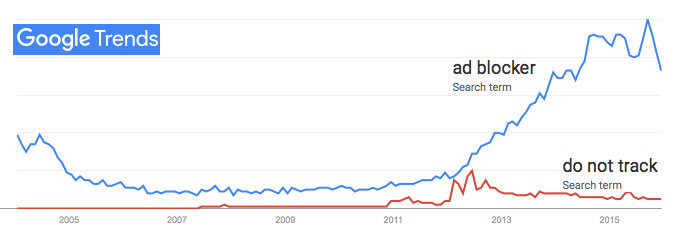While The Cluetrain Manifesto is best known for its 95 theses (especially its first, “Markets are conversations”), the clue that matters most is this one, which runs above the whole list:
we are not seats or eyeballs or end users or consumers.
we are human beings and our reach exceeds your grasp. deal with it.
That was the first clue we wrote. And by “we” I mean Christopher Locke (aka RageBoy), who sent it to the other three authors in early 1999. At that time we were barely focused on what we wanted to do, other than to put something up on the Web.
But that ur-clue, addressed to marketers on behalf of markets, energized and focused everything we wrote on Cluetrain site, and then in the book.
But it failed. Are you hearing me, folks? It failed. For a decade and a half, Cluetrain succeeded as a book and as a meme, but it failed to make its founding clue true. Deal with this:
our reach did not exceed marketers’ grasp.
instead, marketers grasped more than ever, starting with our privacy.
As heedless of manners as a mosh pit on Ecstasy, the online advertising business went nuts with surveillance, planting cookies and beacons in people’s browsers and tracking them like animals, harvesting and shipping off personal data to who-knows-where, all for the dubious purpose of spamming them with advertising based on algorithmic guesswork about what people might want to buy. All this in spite of two simple facts:
- Nobody comes to a webstite for advertising. At most they just tolerate it.
- Most of the time people aren’t buying anything. That’s why people don’t click on ads at a rate that rounds to 100%.
For years we played nice, quietly purging cookies from our browsers’ innards, or just putting up with the abuse. For few years (2007-2012, specifically — see below), we put some hope in Do Not Track.
Then, when that failed (most dramatically in 2012), we started blocking ads, en masse:
More than 200 million of us are blocking ads now, and (in many or most cases) blocking tracking as well. This is great news for Cluetrain fans, because:::
blocking ads and tracking
are great ways to deal with marketers’ grasp.
Depending on marketers to stop bad acting on their own is putting responsibility in the wrong place. It’s our job to stop them. Besides, asking the online advertising business to reform is like asking Versailles to start the French Revolution. Writes Jessica Davies,
I was recently in front of about 400 advertisers talking to them about fraud, and they all nodded their heads and listened, but there was apathy. Behind the scenes I ask them what they’re doing about it and some of them shrug their shoulders…
The funniest conversation I’ve ever had with an agency was when I told them a campaign they had run was 90 percent fraudulent, and their reply was: ‘Oh, I know, but it really performed well. The click-through rates were phenomenal.’ I re-emphasized that those click-throughs were fraudulent; the ads weren’t seen by humans, and their response was ‘The client is happy. We’re renewing the contract.’
Here’s a fact about those clients: They don’t call themselves advertisers, and they don’t have to advertise. To them advertising is overhead. A discretionary expense. They can spend it other ways. I know this, because I was a partner in one of Silicon Valley’s top advertising agencies for the better part of two decades. And, because of that, I also know how well old-fashioned Madison Avenue advertising — the uncomplicated kind not based on tracking — can actually work, while sponsoring publishers and broadcasters of all kinds.
That kind of advertising, aka #SafeAds, is the best hope the online advertising industry and its dependents in publishing and broadcasting actually have — especially if future ad and tracking blockers permit those through while saying #NoAds to the rest.
Now let’s go back to dealing. What else, besides #SafeAds, can we get with leverage from blocking ads and tracking? Clue: it has to be good for both sides. That’s how business works at its best. Both sides win. We don’t need to reach for their privates just because they grasped our privacy.
How about this deal: better signaling between customers and companies than marketing alone can provide— especially when marketing today is mostly about grabbing for “net new” and flushing customers into “the pipeline” through “the funnel.”
We can help companies (and ourselves) a lot more if we have standard ways to connect with sales, service and product and service development functions — and they with us. Then “Markets are conversations” will finally mean what it’s failed to mean for the last sixteen years.
Bonus link: VRM development projects, many of which are already working on this.

Leave a Reply